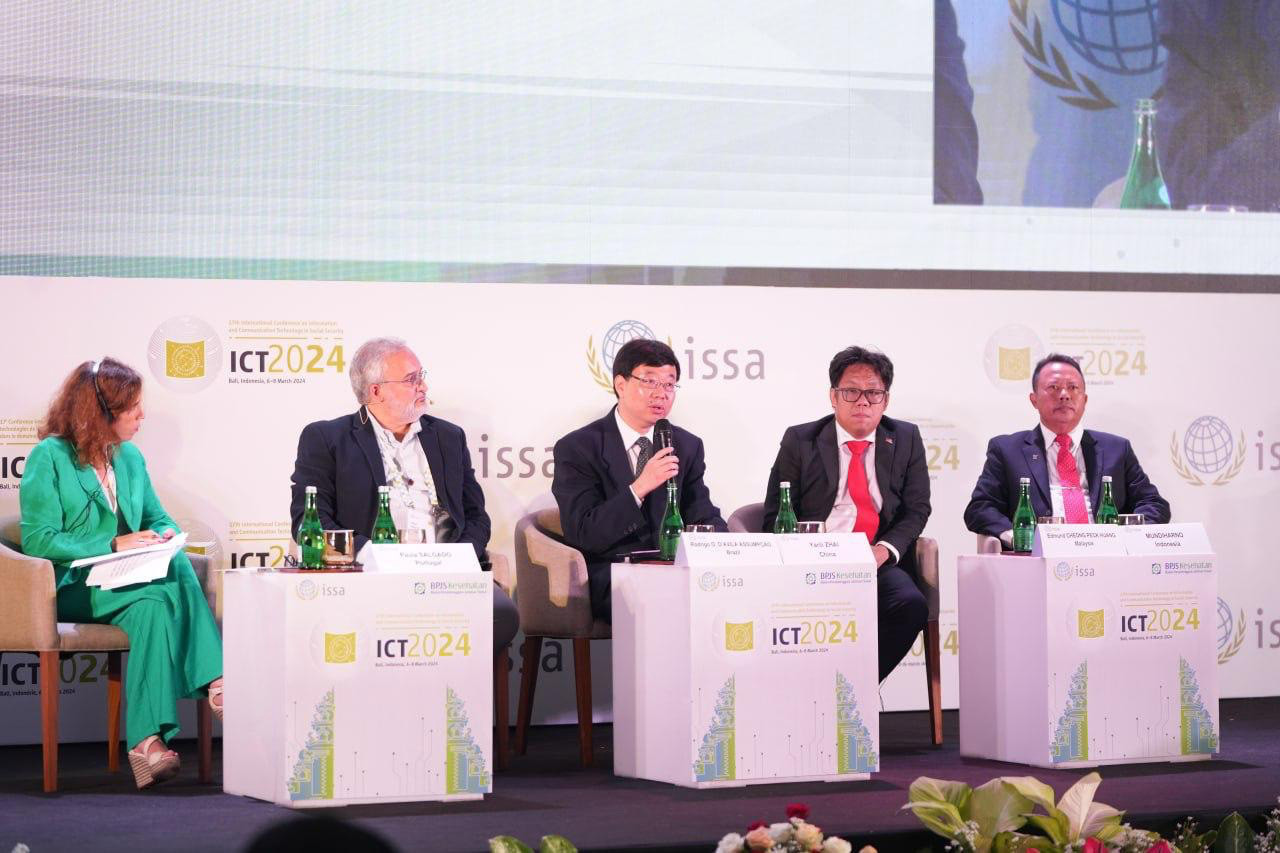Popular Reads
Top Results
Can't find what you're looking for?
View all search resultsPopular Reads
Top Results
Can't find what you're looking for?
View all search resultsNational Data Infrastructure Key to Sustaining BPJS Kesehatan’s Ongoing Health Programs
Change text size
Gift Premium Articles
to Anyone
M
undiharno, Director of Compliance and Interinstitutional Relations at the Health Care and Social Security Agency (BPJS Kesehatan), shared his experience on how the agency utilizes and develops the national data infrastructure in managing national health insurance (JKN) during a panel discussion at the 17th ISSA International Conference on Information and Communication Technology in Social Security (ICT 2024).
Organized by the International Social Security Association (ISSA) and held on March 6 to 8 in Nusa Dua, Bali, ICT 2024 saw the participation of ISSA members from at least 71 countries and territories.
In addition, Mundiharno also told those gather how Indonesia was selected as the host of this year’s ICT.
"Becoming the host of ICT 2024 was actually a long journey of convincing the ISSA to bring its members to see how BPJS Kesehatan has developed in terms of digital transformation in the field of social security in Indonesia,” he said.
“We are grateful that our offer was accepted. This shows that Indonesia has applied high international standards in [its] digital transformation and [this] has become a best practice for other countries," added Mundiharno.
Mundiharno explained that over a decade of implementing the JKN, the national data infrastructure played a significant role in the sustainability of the program.
On average, he continued, BPJS Kesehatan currently managed around 34 million daily membership transactions, including registrations, account histories and data corrections. Meanwhile, the agency also processed 21 million premium payments through banks and nonbank systems, as well as 52 million insurance claims for a variety of services at health facilities.
"All transactions in this data can be carried out due to the support of the national data infrastructure. We also collaborate with ministries [and] agencies. In the financial sector, we are connected to banking facilities and healthcare services. Everything is interconnected and forms a solid JKN ecosystem," said Mundiharno.
The discussion also featured panelists Edmund Cheong Peck Huang, Chief Strategy and Transformation Officer at PERKESO Malaysia, Yanli Zhai, Director General of the Social Insurance Administration at the Ministry of Human Resources and Social Security (MOHRSS) of China, and Noël Alain Olivier Mekulu Mvondo Akame, Director General of the National Social Insurance Fund (CNPS) of Cameroon.
Mundiharno said BPJS Kesehatan also exchanged data with several government agencies. For example, it collaborated most recently in a data exchange with the National Police in relation to the administrative processes for issuing police certificates (SKCK), vehicle registration and driver's licenses.
In addition, BPJS Kesehatan had cooperated with the Legal Administration Directorate General at the Ministry of Law and Human Rights in exchanging data with regard to licenses for businesses and notaries.
Mundiharno said BPJS Kesehatan also had previously worked with the Ministry of Social Affairs and the Ministry of Health on developing the Integrated Social Welfare Data (DTKS) containing data on health facilities, medical devices, medicines and health insurance claims, as well as on the use of digital dashboards for monitoring the JKN.
BPJS Kesehatan also exchanged data with the Ministry of Finance for civil servant payrolls, taxes and the People’s Business Credit (KUR) facility, while it exchanged data with the Ministry of Religious Affairs in relation to participants of the haj and umrah (minor haj) programs as well as religion teachers and students.
Mundiharno emphasized the need for strong commitment and collaboration among institutions, as demonstrated by BPJS Kesehatan and its stakeholders.
"To ensure the sustainability of data exchange [...], BPJS Kesehatan collaborates to evaluate and update various content [and] contexts and bring the same benefits to all parties," he said.
Mundiharno explained that BPJS Kesehatan had benefited from its good practices in using the national data infrastructure, such as to support its membership system and healthcare services, as well as to detect and prevent fraud, all of which helped strengthen the agency’s organizational capacity.
At the same time, the agency also faced several challenges.
"These challenges include uneven internet [access] in Indonesia, regulations related to the Personal Data Protection Law, rapid data growth requiring continuous IT infrastructure [upgrading], which requires financial support,” Mundiharno said.
Data quality, consistency and completeness as well as restricted infrastructure and IT human resources in various institutions were other challenges BPJS Kesehatan had experienced, he said.
Mundiharno emphasized that using the national data infrastructure also helped the government in analyzing and developing health policies, as the data managed by BPJS Kesehatan contained a variety of important variables needed in policy analysis and development. BPJS Kesehatan had data coverage reaching 96 percent and contained key variables such as age, gender, address, socioeconomic status, types of disease and health patterns.
"For example, during the COVID-19 pandemic, the utilization of data and data interoperability between ministries [and] agencies accelerated [the government’s] pandemic response. BPJS Kesehatan's network infrastructure and information systems have made a significant contribution to the Indonesian government,” he said.
“The backbone of the vaccination system used by the government used the information system managed by BPJS Kesehatan. This system could then interoperate with the Ministry of Health, regional governments and the COVID-19 response team to quickly support and provide vaccines to the Indonesian [people].”










